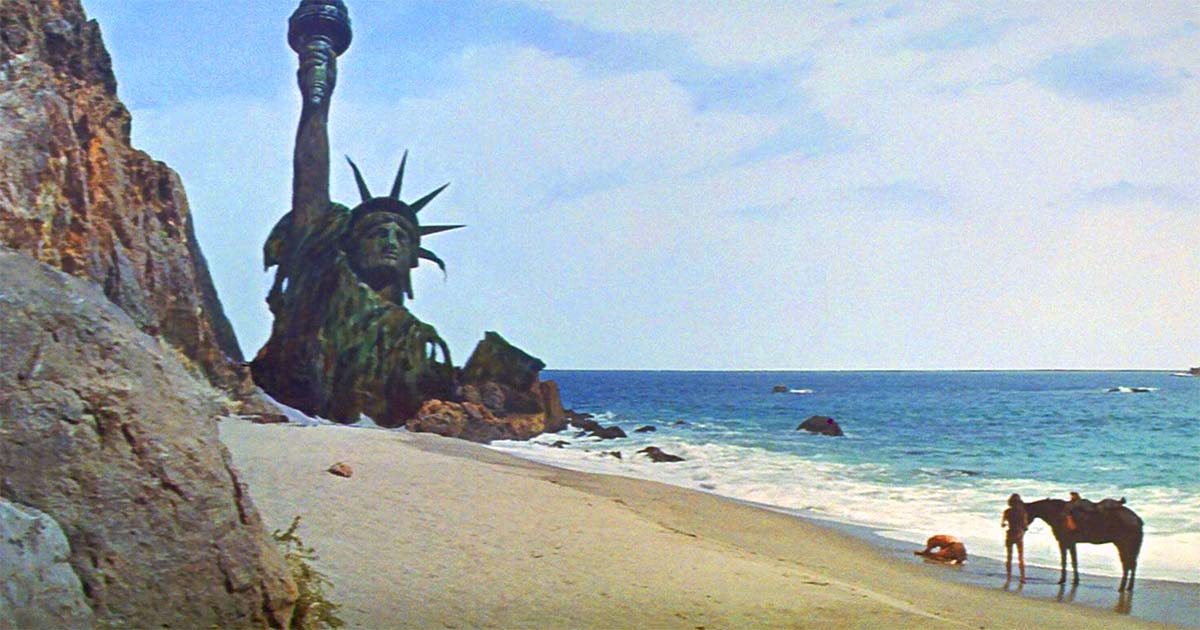What Was the Point in "Planet of the Apes" (1968)?
"Planet of the Apes" (1968) warns of civilization’s collapse through pride, war, and forgotten history, revealing humanity’s downfall beneath the surface of a world ruled by intelligent apes.

The 1968 film "Planet of the Apes" is more than a science fiction adventure. It is a cautionary tale about pride, civilization, and the dangers of forgetting our past.
Based on the 1963 French novel by Pierre Boulle, the film reimagines Earth as a distant, ruined planet where apes rule and men have lost their voice—literally and figuratively. The film's point lies in its reversal of roles and its final, devastating revelation.
The Surface Story
"Planet of the Apes" follows George Taylor, an astronaut who crash-lands on an unfamiliar world. He soon discovers that apes—organized into a rigid social hierarchy—have become the dominant species. Humans are mute, primitive, and hunted.
At first, the film appears to be a sharp role-reversal fantasy. The oppressed have become the oppressors. Apes use nets, cages, and rifles to control a species that once ruled the Earth. The satire is plain. But the film's point goes deeper than a simple inversion.
A Warning to Modern Man
The key to the film is its ending. Taylor escapes captivity and flees across a desert shoreline, only to discover the half-buried remains of the Statue of Liberty. It was Earth all along. The ape world is the distant future of human civilization, now lost to time and destruction.
This twist reorients everything the viewer has seen. The apes did not conquer men from outside. Man destroyed himself. The apes inherited the ruins.
The film becomes a warning. Its point is not that apes will take over. It is that mankind, with all his pride and technology, is capable of erasing himself from history. The fall of man is not dramatic—it is quiet, accidental, and possibly deserved.
The Corruption of Knowledge
A second layer to the film's message lies in how knowledge is controlled. The ape society is religious, bureaucratic, and anti-scientific. The ruling class—mainly orangutans—restricts access to historical truth. They fear the past because it threatens their present order.
Dr. Zaius, the Minister of Science and also the Defender of the Faith, knows more than he admits. He sees Taylor not as a curiosity but as a symbol of a recurring danger. Man, in his view, is violent, arrogant, and self-destructive. Zaius does not want to learn from the past. He wants to suppress it.
The film thus becomes an argument for historical memory. It warns that those in power may prefer myths to truth, and that the cost of forgetting—or hiding—our mistakes is ruin.
Commentary on Race and Class
"Planet of the Apes" also explores social structures — particularly race and class — without preaching. Ape society is divided by species. Orangutans hold political and religious power, gorillas serve as the military, and chimpanzees work as scientists and intellectuals. This caste system reflects the anxieties of the 1960s.
The treatment of humans as inferior beings mirrors real-world injustices. Yet the film does not simply invert race-based hierarchies. It asks what kind of society willingly enslaves others, and how easily one can justify cruelty through tradition and fear.
The Role of the Individual
Taylor himself is no hero in the classic mold. He is bitter, skeptical, and deeply disillusioned with humanity. He left Earth because he had lost faith in it. His journey is not just physical—it is moral. He learns that the thing he ran from cannot be escaped. Mankind's failure is written in the bones beneath his feet.
In the end, Taylor becomes a prophet in a wasteland, shouting into silence. His horror is not just at what he sees, but at what he realizes: that man's final legacy may be dust, bones, and forgotten monuments.
The Point
The point of "Planet of the Apes" is not that apes might rule the Earth. It is that human arrogance, when left unchecked, will lead to decay and oblivion. Civilization does not fall through invasion. It falls through pride, war, and the suppression of truth.
The ruined statue, half-buried in sand, says it plainly. Man's greatest enemy was never nature, never time, and never the ape. It was always himself.

